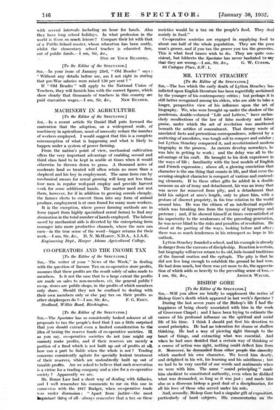MR. LYTTON STRACHEY
[To the Editor of the SPECTATOR.]
Sui,—The loss which the early death of Lytton Strachey has inflicted upon English literature has been regretfully acclaimed by the younger of his contemporary critics ; but perhaps it is still better recognized among his elders, who are able to take a longer, perspective view of his influence upon the art of biography. We, who were brought up under the shadow of the ponderous, double-volumed "Life and Letters," have melan- choly recollections of the law of false modesty and falser praise, under which the art of revelation was smothered beneath the artifice of concealment. That dreary waste of unrelated facts and pretentious correspondence, relieved by a scattering of anecdotes, was tough soil to conquer and subdue ; but Lytton Strachey conquered it, and revolutionised modern biography in the process. As careers develop nowadays, he was late in getting to work ; and the delay was all. to the advantage of his craft. He brought to his desk experience in the ways of life ; familiarity with the best models of English and French expression ; above all, a glowing conviction that character is the one thing that counts in life, and that even the seeming-simplest character is compact of various and contend- hig elements. If to these other gifts he added in a double measure an air of irony and detachment, his was an irony that was never far removed from pity, and a detachment that held his subject at arm's length, only to place him, with a gesture of discreet propriety, in his true relation to the world around him. He was the citizen of an intellectual republic which was breaking free from the tyranny of hypocrisy and pretence ; and, if he showed himself at times over-satisfied at his superiority to the weaknesses of the preceding generation, he was never blind to the risks and penalties of revolution. He stood at the parting of the ways, looking before and after ; there was as much tenderness in his retrospect as hope in his outlook.
Lytton Strachey founded a school, and his example is already in danger from the excesses of discipleship. Reaction is certain, but biography will never return to its old, hide-bound traditions of the funeral oration and the epitaph. The pity is that he did not live long enough to establish the ground he bad won. He had done much, but there was yet more to do, the apprecia- lion of which adds so heavily to the prevailing sense of loss.—




































 Previous page
Previous page